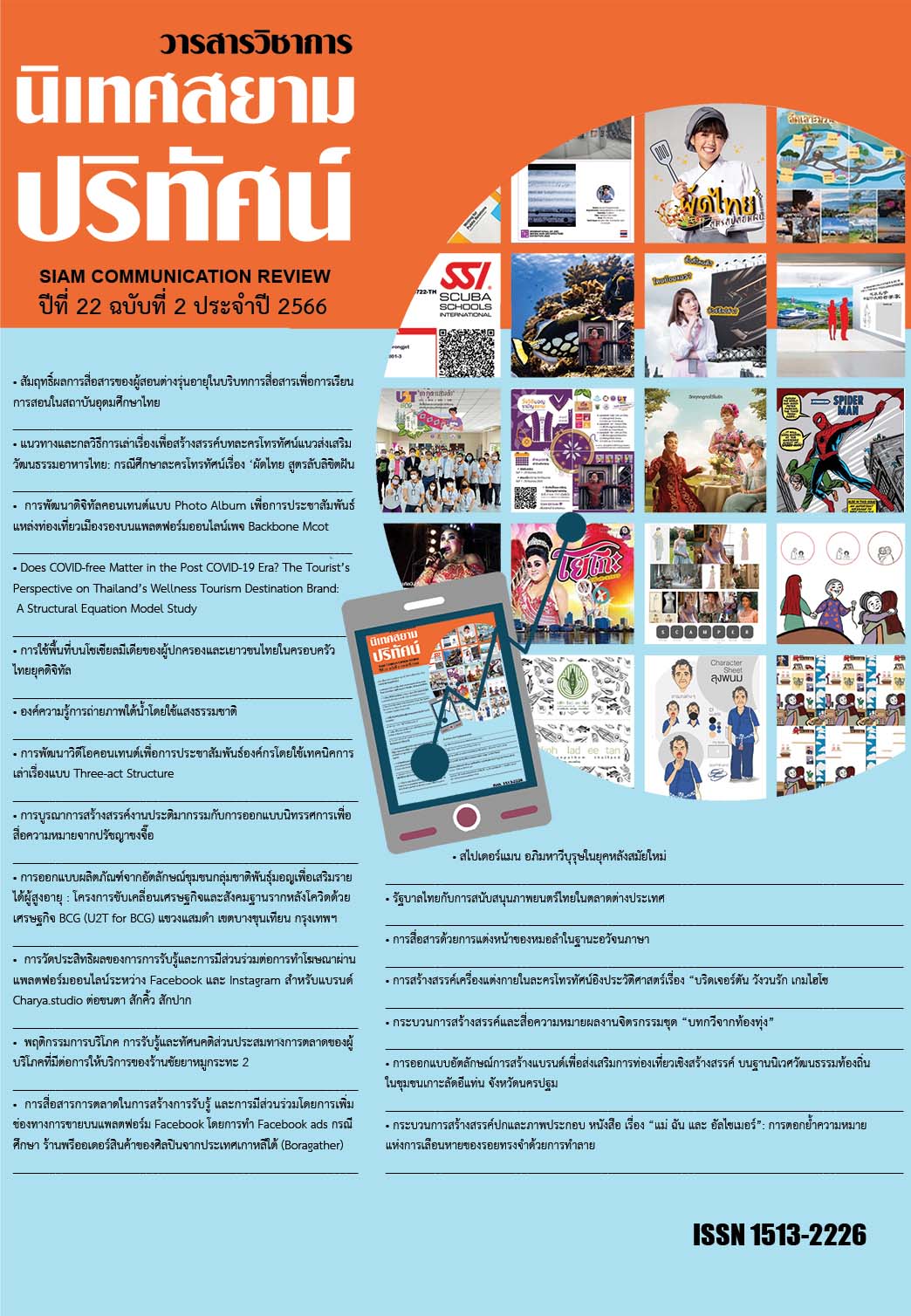Does COVID-free Matter in the Post COVID-19 Era? The Tourist’s Perspective on Thailand’s Wellness Tourism Destination Brand: A Structural Equation Model Study
Main Article Content
บทคัดย่อ
อุตสาหกรรมการท่องเที่ยวของประเทศไทยได้รับผลกระทบอย่างหนักจากการแพร่ระบาดของเชื้อโคโรน่าไวรัสหรือที่เรียกกันว่า โควิด-19 ส่งผลให้ผลิตภัณฑ์มวลรวมของไทยมีมูลค่าลดลง และมีอัตราการว่างงานภายในประเทศที่พุ่งสูงขึ้น เพื่อกระตุ้นเศรษฐกิจเมื่อพ้นภาวะวิกฤตของการแพร่ระบาด ผู้วิจัยเล็งเห็นถึงโอกาสจากความนิยมที่เพิ่มสูงขึ้นของการท่องเที่ยวเชิงสุขภาพ (Wellness Tourism) ซึ่งสอดคล้องกับศักยภาพที่โดดเด่นในอุตสาหกรรมเชิงสุขภาพของไทย จึงเป็นที่มาของงานวิจัย “ความสำคัญของการสื่อสารเกี่ยวกับสถานการณ์ปลอดโควิด ในช่วงหลังการแพร่ระบาดของโควิด-19 ผ่านการศึกษามุมมองของนักท่องเที่ยวที่มีต่อตราสถานที่ท่องเที่ยวเชิงสุขภาพของประเทศไทยด้วยการวิเคราะห์สมการโครงสร้าง” ชิ้นนี้ ทั้งนี้ งานวิจัยนี้เป็นการวิจัยเชิงปริมาณ โดยการสำรวจนักท่องเที่ยวต่างชาติจำนวน 408 คนที่มาเที่ยวประเทศไทยด้วยวัตถุประสงค์เชิงสุขภาพ และวิเคราะห์ด้วยแบบจำลองสมการโครงสร้างเพื่อตรวจสอบปัจจัยต่าง ๆ ที่เกี่ยวข้องกับการท่องเที่ยวเชิงสุขภาพในประเทศไทย ซึ่งรวมถึงการรับรู้ตราสถานที่ท่องเที่ยวเชิงสุขภาพ ทัศนคติต่อตราสถานที่ท่องเที่ยวเชิงสุขภาพของไทย ปัจจัยที่เกี่ยวข้องกับโควิด-19 และการเลือกประเทศไทยเป็นจุดหมายปลายทางของการท่องเที่ยวเชิงสุขภาพ ผลการศึกษาพบว่าในปัจจุบันนักท่องเที่ยวมีทัศนคติต่อประเทศไทยระดับดีเยี่ยมในมิติการสะท้อน (Reflection) อัตลักษณ์ตนเอง (Self-Image) และวัฒนธรรม (Culture) และยังมีส่วนที่ควรปรับปรุงในด้านกายภาพ (Physique) บุคลิกภาพ (Personality) และความสัมพันธ์ (Relationship) เพื่อตอบสนองความคาดหวังของนักท่องเที่ยวและเพิ่มขีดความสามารถในการแข่งขันในตลาดการท่องเที่ยวเชิงสุขภาพ นอกจากนี้ งานวิจัยยังพบว่า ในการสื่อสารหลังภาวะวิกฤตสำหรับวิกฤตการณ์โควิด-19 การเน้นย้ำเกี่ยวกับการแพร่ระบาดและการคลี่คลายของสถานการณ์ไม่ส่งผลต่อการเลือกประเทศไทยเป็นสถานที่ท่องเที่ยวเชิงสุขภาพ ดังนั้น การเน้นย้ำความโดดเด่นในด้านวัฒนธรรมและบริการอื่น ๆ ที่สร้างประสบการณ์ด้านการท่องเที่ยวเชิงสุขภาพที่ครอบคลุมน่าจะตอบสนองความต้องการและดึงดูดนักท่องเที่ยวได้มากกว่า
Article Details

อนุญาตภายใต้เงื่อนไข Creative Commons Attribution-NonCommercial-NoDerivatives 4.0 International License.
เอกสารอ้างอิง
Avraham, E. (2006). Public relations and advertising strategies for managing tourist destination image crises. In Y. Mansfeld & A. Pizam (Eds.), Tourism, security and safety: From theory to practice (pp. 233-250). Elsevier.
Griffin, A. (2014). Crisis, issues and reputation management. Kogan Page Limited.
Henderson, J. C. (2007). Tourism Crises: Causes, Consequences and Management. Elsevier Inc.
Hongjanya, K. (2019). Nation branding based on semiotic analysis: A case study of Thailand brand. (Doctoral dissertation). National Institute of Development Administration, Thailand.
Kapferer, J. N. (2008). The new strategic brand management - creating and sustaining brand equity long term. Kogan Page.
Morgan, N., Pritchard, A., & Pride, R. (2004). Destination branding : creating the unique destination proposition (2nd ed.). Elsevier.
Ngudgratoke, S. (2019). Stuctural Equation Model for Social Science Research [Powerpoint Slide]. Bangkok, TH, National Institute of Development Administration.
Simon, H. (2020). COVID-19 and Travel : Impacts, Responses and Outcomes. Goodfellow Publishers.
Thailand Medical Hub of Department of Health Service Support. (2019). The Report on Research and Survey of Thailand's Medical and Wellness Services for Supporting Medical Hub Policy. Bangkok, Thailand: Pimtunjai.
Weiler, B., & Hall, C. M. (1992). Special interest tourism. Belhaven Press.
Online
Avraham, E., & Ketter, E. (2017, 2017/07/24). Destination marketing during and following crises: combating negative images in Asia. Journal of Travel & Tourism Marketing, 34(6), 709-718. https://doi.org/10.1080/10548408.2016.1237926
Balakrishnan Nair, B., & Sinha, S. (2020). COVID-19 and future travel decisions: How do the destination-choice-based motivators redefine tourist's choices? Enlightening Tourism, 10(2), 17.
Berrozpe, A., Campo, S., & Yagüe, M. J. (2017, 2017/10/13). Understanding the identity of Ibiza, Spain. Journal of Travel & Tourism Marketing, 34(8), 1033-1046. https://doi.org/10.1080/10548408.2016.1272525
Campiranon, K. (2009). Critical success factors of crisis management in tourism: A case study of political crisis in Thailand (Research Report). Retrieved from https://libdoc.dpu.ac.th/research/132990
Chakraborty, I., & Maity, P. (2020, 2020/08/01/). COVID-19 outbreak: Migration, effects on society, global environment and prevention. Science of The Total Environment, 728. https://doi.org/10.1016/j.scitotenv.2020.138882
Charumilind, S., Craven, M., Lamb, J., Sabow, A., & Wilson, M. (2020). When will the COVID-19 pandemic end? Retrieved 18 January 2021, from https://mckinsey.com/industries/healthcare-systems-and-services/our-insights/when-will-the-covid-19-pandemic-end
Chebli, A., & Foued, B. S. (2020, 07/21). The impact of covid-19 on tourist consumption behaviour : A perspective article. Journal of Tourism Management Research, 7, 169-207. https://doi.org/10.18488/journal.31.2020.72.196.207
Colmekcioglu, N., Dineva, D., & Lu, X. (2022). “Building back better”: the impact of the COVID-19 pandemic on the resilience of the hospitality and tourism industries. International Journal of Contemporary Hospitality Management, 34(11), 4103-4122. https://doi.org/10.1108/IJCHM-12-2021-1509
Gopalakrishnan, B. N., Peters, R., & Vanzetti, D. (2020). Covid-19 and tourism: Assessing the economic consequences. https://unctad.org/webflyer/covid-19-and-tourism-assessing-economic-consequences#:~:text=The%20COVID%2D19%20pandemic% 20has,disruptions%20in%20the%20global%20economy.&text=In%20some%20countries%2C%20unemployment%20could,is%20up%20to%20one%20year.
Hashemi, S., Jusoh, J., Kiumarsi, S., & Mohammadi, S. (2015). Influence factors of spa and wellness tourism on revisit intention: The mediating role of international tourist motivation and tourist satisfaction. International Journal of Research, 3(7), 1-11.
Kim, E., Chiang, L., & Tang, L. (2017, 2017/09/02). Investigating wellness tourists’ motivation, engagement, and loyalty: in search of the missing link. Journal of Travel & Tourism Marketing, 34(7), 867-879. https://doi.org/10.1080/10548408.2016.1261756
Kongtaveesawas, N., Prasarnphanich, P., Sinthupinyo, S., & Ashton, A. S. (2022). Attribute Framework Validation for Wellness Tourism within the Context of Thailand. Sustainability, 14(10), 5953. https://www.mdpi.com/2071-1050/14/10/5953
Languepin, O. (2020, 12 May). 2020 Tourist Arrivals Forecast cut to 14 million. Thailand Business News. https://www.thailand-business-news.com/tourism/79170-2020-tourist-arrivals-forecast-cut-to-14-million.html
Li, M., & Cai, L. A. (2012). The Effects of Personal Values on Travel Motivation and Behavioral Intention. Journal of Travel Research, 51(4), 473-487. https://doi.org/10.1177/0047287511418366
Mokhtarian, P., Salomon, I., & Singer, M. (2015, 03/06). What Moves Us? An Interdisciplinary Exploration of Reasons for Traveling. Transport Reviews, 35. https://doi.org/10.1080/01441647.2015.1013076
Prommahaa, J. (2015). Destination branding: Brand management and brand engagement of health and wellness tourism in Thailand and the ASEAN region. Sociology, 5(8), 653-675.


